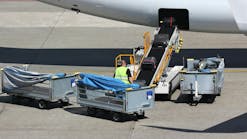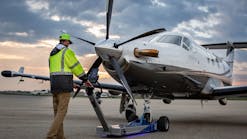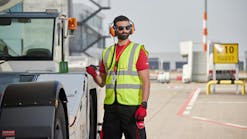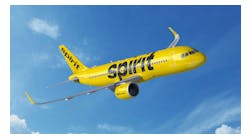Reports filed by federal aviation inspectors during the first month of a strike by Northwest Airlines Corp.'s mechanics challenge assertions by executives that operations are running smoothly, according to a newspaper's review of the records.
In a story for Sunday's editions, the Star Tribune newspaper reported that the inspection records _ which were reviewed by two independent aviation experts _ describe training deficiencies among replacement workers, thin staffing, maintenance blunders and mistakes in recording aircraft repairs.
It cites one incident in which mechanics failed to find a dead bird in the engine of a jet about to leave Memphis, Tenn., but a co-pilot spotted it before takeoff.
In another case, it said inspectors watched replacement workers in Philadelphia work through the night to replace a brake. That job normally takes experienced mechanics less than three hours, the experts said.
The Star Tribune reported that Northwest declined to discuss the substance of more than 100 reports it obtained.
On Sunday, Eagan-based Northwest said in a statement it had told the newspaper that the company considered it inappropriate for it to comment on FAA internal documents.
"Northwest remains confident in the quality of its ongoing maintenance program. Our operation continues to run normally," the airline said. The statement also said the discovery of the dead bird came from the typical visual preflight safety inspection by the co-pilot, which would reveal such issues.
Since the mechanics walked out Aug. 20, Northwest has used 1,200 replacements, a few hundred managers and outside vendors to maintain and repair its planes. According to AMFA, about 40 of its members have crossed the picket lines. Since the strike began, Northwest has filed for bankruptcy protection, which typically triggers more FAA inspections at an airline to ensure maintenance is not compromised.
After the strike, the FAA raised the number of personnel assigned to Northwest from 53 to about 80. The additional inspectors allow the FAA to conduct more spot checks and write more reports, but the agency still can't monitor all activities at the nation's fourth-largest airline, which operates 1,400 daily flights.
Before the strike, Northwest insisted its replacement workers were fully licensed and trained, and that it wouldn't compromise on safety.
But Northwest has acknowledged conducting "refresher training" for replacements since the strike began to ensure proper documentation of aircraft maintenance, a crucial safety discipline, the Star Tribune reported.
Federal Aviation Administration spokeswoman Elizabeth Cory said the training was initiated after the agency's top inspection manager at Northwest discussed record-keeping problems with the airline. That training has been completed.
Cory said the FAA does not comment on how well individual airlines comply with regulations. But she said many of the FAA inspection reports found no faults, while Northwest promptly corrected shortcomings. A few reports remain under investigation.
She said the FAA is "seeing great improvement in the logbook area" since replacements were retrained. And she said Northwest is complying with staffing level rules.
In its statement Sunday, Northwest said several of the issues were addressed by the time the Star Tribune contacted it Tuesday. It said all repairs were completed according to Boeing and Airbus maintenance procedures and had met the airline's maintenance standards.
"None of the items provided by the Star Tribune involved safety of flight issues," Northwest said.
With hundreds of inspection reports still unavailable, it is impossible to draw definitive conclusions about safety at the airline from the sample of FAA reports it reviewed, the newspaper reported. None of the reports revealed any in-flight maintenance problems.
Union leaders for Northwest's 4,200 striking mechanics told the Star Tribune that the FAA reports bolster their contentions that the airline's reliance on replacement mechanics has put the public at risk.
"These records provide examples that are even worse than we imagined," said John Glynn, maintenance standards coordinator for the Aircraft Mechanics Fraternal Association.
The Star Tribune said it had the FAA documents, along with dozens of Northwest's internal aircraft maintenance logs, reviewed last week by former National Transportation Safety Board member John Goglia and by John Krawczyk, a former mechanic and maintenance inspector for United Airlines with 20 years of airline maintenance experience. It said Krawczyk has no ties to Northwest or its mechanics' union.
Krawczyk said the mistakes exposed the public to danger.
Goglia, a licensed airframe and powerplant mechanic who is a professor of aviation science at St. Louis University, said he saw evidence of training deficiencies and documentation errors throughout the inspection reports and maintenance logs.
News stories provided by third parties are not edited by "Site Publication" staff. For suggestions and comments, please click the Contact link at the bottom of this page.





